- Home
- Virginia Woolf
To The Lighthouse Page 9
To The Lighthouse Read online
Page 9
There was something, of course, that people wanted; for when Minta took
her hand and held it, Nancy, reluctantly, saw the whole world spread
out beneath her, as if it were Constantinople seen through a mist, and
then, however heavy-eyed one might be, one must needs ask, "Is that
Santa Sofia?" "Is that the Golden Horn?" So Nancy asked, when Minta
took her hand. "What is it that she wants? Is it that?" And what was
that? Here and there emerged from the mist (as Nancy looked down upon
life spread beneath her) a pinnacle, a dome; prominent things, without
names. But when Minta dropped her hand, as she did when they ran down
the hillside, all that, the dome, the pinnacle, whatever it was that
had protruded through the mist, sank down into it and disappeared.
Minta, Andrew observed, was rather a good walker. She wore more
sensible clothes that most women. She wore very short skirts and black
knickerbockers. She would jump straight into a stream and flounder
across. He liked her rashness, but he saw that it would not do--she
would kill herself in some idiotic way one of these days. She seemed
to be afraid of nothing--except bulls. At the mere sight of a bull in
a field she would throw up her arms and fly screaming, which was the
very thing to enrage a bull of course. But she did not mind owning up
to it in the least; one must admit that. She knew she was an awful
coward about bulls, she said. She thought she must have been tossed in
her perambulator when she was a baby. She didn't seem to mind what she
said or did. Suddenly now she pitched down on the edge of the cliff
and began to sing some song about
Damn your eyes, damn your eyes.
They all had to join in and sing the chorus, and shout out together:
Damn your eyes, damn your eyes,
but it would be fatal to let the tide come in and cover up all the good
hunting-grounds before they got on to the beach.
"Fatal," Paul agreed, springing up, and as they went slithering down,
he kept quoting the guide-book about "these islands being justly
celebrated for their park-like prospects and the extent and variety of
their marine curiosities." But it would not do altogether, this
shouting and damning your eyes, Andrew felt, picking his way down the
cliff, this clapping him on the back, and calling him "old fellow" and
all that; it would not altogether do. It was the worst of taking women
on walks. Once on the beach they separated, he going out on to the
Pope's Nose, taking his shoes off, and rolling his socks in them and
letting that couple look after themselves; Nancy waded out to her own
rocks and searched her own pools and let that couple look after
themselves. She crouched low down and touched the smooth rubber-like
sea anemones, who were stuck like lumps of jelly to the side of the
rock. Brooding, she changed the pool into the sea, and made the minnows
into sharks and whales, and cast vast clouds over this tiny world by
holding her hand against the sun, and so brought darkness and
desolation, like God himself, to millions of ignorant and innocent
creatures, and then took her hand away suddenly and let the sun stream
down. Out on the pale criss-crossed sand, high-stepping, fringed,
gauntleted, stalked some fantastic leviathan (she was still enlarging
the pool), and slipped into the vast fissures of the mountain side.
And then, letting her eyes slide imperceptibly above the pool and rest
on that wavering line of sea and sky, on the tree trunks which the
smoke of steamers made waver on the horizon, she became with all that
power sweeping savagely in and inevitably withdrawing, hypnotised, and
the two senses of that vastness and this tininess (the pool had
diminished again) flowering within it made her feel that she was bound
hand and foot and unable to move by the intensity of feelings which
reduced her own body, her own life, and the lives of all the people in
the world, for ever, to nothingness. So listening to the waves,
crouching over the pool, she brooded.
And Andrew shouted that the sea was coming in, so she leapt splashing
through the shallow waves on to the shore and ran up the beach and was
carried by her own impetuosity and her desire for rapid movement right
behind a rock and there--oh, heavens! in each other's arms, were Paul
and Minta kissing probably. She was outraged, indignant. She and
Andrew put on their shoes and stockings in dead silence without saying
a thing about it. Indeed they were rather sharp with each other. She
might have called him when she saw the crayfish or whatever it was,
Andrew grumbled. However, they both felt, it's not our fault. They
had not wanted this horrid nuisance to happen. All the same it
irritated Andrew that Nancy should be a woman, and Nancy that Andrew
should be a man, and they tied their shoes very neatly and drew the
bows rather tight.
It was not until they had climbed right up on to the top of the cliff
again that Minta cried out that she had lost her grandmother's brooch--
her grandmother's brooch, the sole ornament she possessed--a weeping
willow, it was (they must remember it) the tears running down her
cheeks, the brooch which her grandmother had fastened her cap with till
the last day of her life. Now she had lost it. She would rather have
lost anything than that! She would go back and look for it. They all
went back. They poked and peered and looked. They kept their heads
very low, and said things shortly and gruffly. Paul Rayley searched
like a madman all about the rock where they had been sitting. All this
pother about a brooch really didn't do at all, Andrew thought, as Paul
told him to make a "thorough search between this point and that." The
tide was coming in fast. The sea would cover the place where they had
sat in a minute. There was not a ghost of a chance of their finding it
now. "We shall be cut off!" Minta shrieked, suddenly terrified. As if
there were any danger of that! It was the same as the bulls all over
again--she had no control over her emotions, Andrew thought. Women
hadn't. The wretched Paul had to pacify her. The men (Andrew and Paul
at once became manly, and different from usual) took counsel briefly
and decided that they would plant Rayley's stick where they had sat and
come back at low tide again. There was nothing more that could be done
now. If the brooch was there, it would still be there in the morning,
they assured her, but Minta still sobbed, all the way up to the top of
the cliff. It was her grandmother's brooch; she would rather have lost
anything but that, and yet Nancy felt, it might be true that she minded
losing her brooch, but she wasn't crying only for that. She was crying
for something else. We might all sit down and cry, she felt. But she
did not know what for.
They drew ahead together, Paul and Minta, and he comforted her, and
said how famous he was for finding things. Once when he was a little
boy he had found a gold watch. He would get up at daybreak and he was
positive he would find it. It seemed to him that it would be
almost dark, an
d he would be alone on the beach, and somehow it would
be rather dangerous. He began telling her, however, that he would
certainly find it, and she said that she would not hear of his getting
up at dawn: it was lost: she knew that: she had had a presentiment when
she put it on that afternoon. And secretly he resolved that he would
not tell her, but he would slip out of the house at dawn when they were
all asleep and if he could not find it he would go to Edinburgh and buy
her another, just like it but more beautiful. He would prove what he
could do. And as they came out on the hill and saw the lights of the
town beneath them, the lights coming out suddenly one by one seemed
like things that were going to happen to him--his marriage, his
children, his house; and again he thought, as they came out on to the
high road, which was shaded with high bushes, how they would retreat
into solitude together, and walk on and on, he always leading her, and
she pressing close to his side (as she did now). As they turned by the
cross roads he thought what an appalling experience he had been
through, and he must tell some one--Mrs Ramsay of course, for it took
his breath away to think what he had been and done. It had been far
and away the worst moment of his life when he asked Minta to marry him.
He would go straight to Mrs Ramsay, because he felt somehow that she
was the person who had made him do it. She had made him think he could
do anything. Nobody else took him seriously. But she made him believe
that he could do whatever he wanted. He had felt her eyes on him all
day today, following him about (though she never said a word) as if she
were saying, "Yes, you can do it. I believe in you. I expect it of
you." She had made him feel all that, and directly they got back (he
looked for the lights of the house above the bay) he would go to her
and say, "I've done it, Mrs Ramsay; thanks to you." And so turning into
the lane that led to the house he could see lights moving about in the
upper windows. They must be awfully late then. People were getting
ready for dinner. The house was all lit up, and the lights after the
darkness made his eyes feel full, and he said to himself, childishly,
as he walked up the drive, Lights, lights, lights, and repeated in a
dazed way, Lights, lights, lights, as they came into the house staring
about him with his face quite stiff. But, good heavens, he said to
himself, putting his hand to his tie, I must not make a fool of
myself.)
15
"Yes," said Prue, in her considering way, answering her mother's
question, "I think Nancy did go with them."
16
Well then, Nancy had gone with them, Mrs Ramsay supposed, wondering, as
she put down a brush, took up a comb, and said "Come in" to a tap at
the door (Jasper and Rose came in), whether the fact that Nancy was
with them made it less likely or more likely that anything would
happen; it made it less likely, somehow, Mrs Ramsay felt, very
irrationally, except that after all holocaust on such a scale was not
probable. They could not all be drowned. And again she felt alone in
the presence of her old antagonist, life.
Jasper and Rose said that Mildred wanted to know whether she should
wait dinner.
"Not for the Queen of England," said Mrs Ramsay emphatically.
"Not for the Empress of Mexico," she added, laughing at Jasper; for he
shared his mother's vice: he, too, exaggerated.
And if Rose liked, she said, while Jasper took the message, she might
choose which jewels she was to wear. When there are fifteen people
sitting down to dinner, one cannot keep things waiting for ever. She
was now beginning to feel annoyed with them for being so late; it was
inconsiderate of them, and it annoyed her on top of her anxiety about
them, that they should choose this very night to be out late, when, in
fact, she wished the dinner to be particularly nice, since William
Bankes had at last consented to dine with them; and they were having
Mildred's masterpiece--BOEUF EN DAUBE. Everything depended upon things
being served up to the precise moment they were ready. The beef, the
bayleaf, and the wine--all must be done to a turn. To keep it waiting
was out of the question. Yet of course tonight, of all nights, out
they went, and they came in late, and things had to be sent out,
things had to be kept hot; the BOEUF EN DAUBE would be entirely spoilt.
Jasper offered her an opal necklace; Rose a gold necklace. Which
looked best against her black dress? Which did indeed, said Mrs Ramsay
absent-mindedly, looking at her neck and shoulders (but avoiding her
face) in the glass. And then, while the children rummaged among her
things, she looked out of the window at a sight which always amused
her--the rooks trying to decide which tree to settle on. Every time,
they seemed to change their minds and rose up into the air again,
because, she thought, the old rook, the father rook, old Joseph was her
name for him, was a bird of a very trying and difficult disposition.
He was a disreputable old bird, with half his wing feathers missing.
He was like some seedy old gentleman in a top hat she had seen playing
the horn in front of a public house.
"Look!" she said, laughing. They were actually fighting. Joseph and
Mary were fighting. Anyhow they all went up again, and the air was
shoved aside by their black wings and cut into exquisite out, out,
out--she could never describe it accurately enough to please herself--
was one of the loveliest of all to her. Look at that, she said to
Rose, hoping that Rose would see it more clearly than she could. For
one's children so often gave one's own perceptions a little thrust
forwards.
But which was it to be? They had all the trays of her jewel-case
open. The gold necklace, which was Italian, or the opal necklace,
which Uncle James had brought her from India; or should she wear her
amethysts?
"Choose, dearests, choose," she said, hoping that they would make
haste.
But she let them take their time to choose: she let Rose, particularly,
take up this and then that, and hold her jewels against the black
dress, for this little ceremony of choosing jewels, which was gone
through every night, was what Rose liked best, she knew. She had some
hidden reason of her own for attaching great importance to this
choosing what her mother was to wear. What was the reason, Mrs Ramsay
wondered, standing still to let her clasp the necklace she had chosen,
divining, through her own past, some deep, some buried, some quite
speechless feeling that one had for one's mother at Rose's age. Like
all feelings felt for oneself, Mrs Ramsay thought, it made one sad. It
was so inadequate, what one could give in return; and what Rose felt
was quite out of proportion to anything she actually was. And Rose
would grow up; and Rose would suffer, she supposed, with these deep
feelings, and she said she was ready now, and they would go down, and
Jasper, because he was the gentleman, should give her his arm, and
the handkerchief), and what else? oh, yes, it might be cold: a shawl.
Choose me a shawl, she said, for that would please Rose, who was bound
to suffer so. "There," she said, stopping by the window on the
landing, "there they are again." Joseph had settled on another tree-
top. "Don't you think they mind," she said to Jasper, "having their
wings broken?" Why did he want to shoot poor old Joseph and Mary? He
shuffled a little on the stairs, and felt rebuked, but not seriously,
for she did not understand the fun of shooting birds; and they did not
feel; and being his mother she lived away in another division of the
world, but he rather liked her stories about Mary and Joseph. She made
him laugh. But how did she know that those were Mary and Joseph? Did
she think the same birds came to the same trees every night? he asked.
But here, suddenly, like all grown-up people, she ceased to pay him the
least attention. She was listening to a clatter in the hall.
"They've come back!" she exclaimed, and at once she felt much more
annoyed with them than relieved. Then she wondered, had it happened?
She would go down and they would tell her--but no. They could not tell
her anything, with all these people about. So she must go down and
begin dinner and wait. And, like some queen who, finding her people
gathered in the hall, looks down upon them, and descends among them,
and acknowledges their tributes silently, and accepts their devotion
and their prostration before her (Paul did not move a muscle but looked
straight before him as she passed) she went down, and crossed the hall
and bowed her head very slightly, as if she accepted what they could
not say: their tribute to her beauty.
But she stopped. There was a smell of burning. Could they have let the
BOEUF EN DAUBE overboil? she wondered, pray heaven not! when the
great clangour of the gong announced solemnly, authoritatively, that
all those scattered about, in attics, in bedrooms, on little perches of
their own, reading, writing, putting the last smooth to their hair, or
fastening dresses, must leave all that, and the little odds and ends on
their washing-tables and dressing tables, and the novels on the bed-
tables, and the diaries which were so private, and assemble in the
dining-room for dinner.
17
But what have I done with my life? thought Mrs Ramsay, taking her
place at the head of the table, and looking at all the plates making
white circles on it. "William, sit by me," she said. "Lily," she
said, wearily, "over there." They had that--Paul Rayley and Minta
Doyle--she, only this--an infinitely long table and plates and knives.
At the far end was her husband, sitting down, all in a heap, frowning.
What at? She did not know. She did not mind. She could not
understand how she had ever felt any emotion or affection for him. She
had a sense of being past everything, through everything, out of
everything, as she helped the soup, as if there was an eddy--there--
and one could be in it, or one could be out of it, and she was out of
it. It's all come to an end, she thought, while they came in one after
another, Charles Tansley--"Sit there, please," she said--Augustus
Carmichael--and sat down. And meanwhile she waited, passively, for
some one to answer her, for something to happen. But this is not a
thing, she thought, ladling out soup, that one says.
Raising her eyebrows at the discrepancy--that was what she was
thinking, this was what she was doing--ladling out soup--she felt, more
and more strongly, outside that eddy; or as if a shade had fallen, and,
robbed of colour, she saw things truly. The room (she looked round it)
was very shabby. There was no beauty anywhere. She forebore to look at
Mr Tansley. Nothing seemed to have merged. They all sat separate.
And the whole of the effort of merging and flowing and creating rested

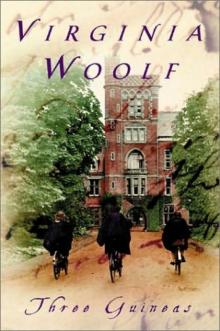 Three Guineas
Three Guineas Flush
Flush Mrs. Dalloway
Mrs. Dalloway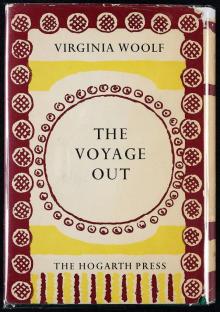 The Voyage Out
The Voyage Out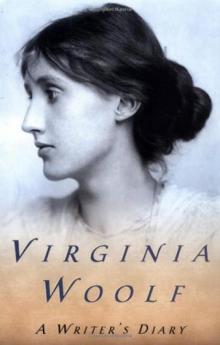 A Writer's Diary: Being Extracts From the Diary of Virginia Woolf
A Writer's Diary: Being Extracts From the Diary of Virginia Woolf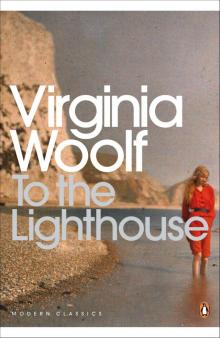 To The Lighthouse
To The Lighthouse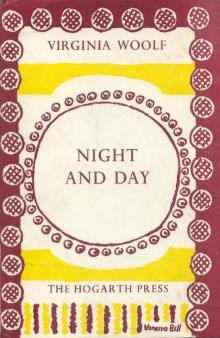 Night and Day
Night and Day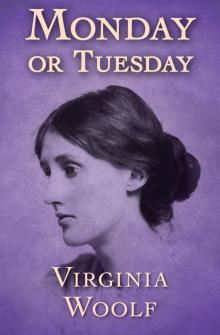 Monday or Tuesday
Monday or Tuesday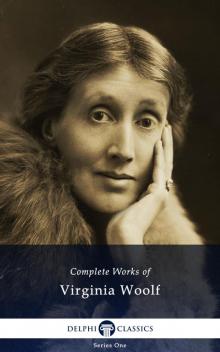 Complete Works of Virginia Woolf
Complete Works of Virginia Woolf Orlando
Orlando Genius and Ink
Genius and Ink Mrs. Dalloway (Annotated)
Mrs. Dalloway (Annotated) Jacob's Room
Jacob's Room THE RUSSIAN POINT OF VIEW
THE RUSSIAN POINT OF VIEW A Writer's Diary
A Writer's Diary Woolf Short Stories
Woolf Short Stories